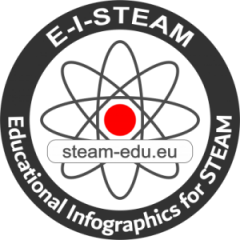Online meeting -18-22.10.2021
Host institution: Liceul Teoretic “Tudor Arghezi”, Craiova, Romania
According to the project application, the activity was to be attended by 6 students and 2 teachers from each participating partner school, and the meeting itself was to take place at the Liceul Teoretic “Tudor Arghezi” in Craiova (Romania). However, the pandemic situation forced a change of format and the meeting was held on-line on October 18-22, 2021. The advantage of this form of organization of the meeting was that a much larger group of students and teachers participated in the meeting.
The purpose of this activity was to test the effectiveness of the infographics toolkit in teaching different subjects. In addition, thanks to the presentations prepared in advance, students from individual countries learned about the culture, lifestyle, problems faced by their peers and the interests of their schoolmates in Romania, Greece, North Macedonia, Italy, Spain and Poland. Each of the partner schools also prepared a presentation of their region and school.
The meeting began with the introduction of students from all partner schools. They also exchanged their contact details, which enabled them to work together on the following days of the meeting. Students from each participating school presented infographics created for the implementation of STEAM lessons (mathematics, physics, chemistry, biology, computer science and art). Students from our school presented infographics used in chemistry lessons.
A very interesting element of the meeting was the part of it, when the students themselves created infographics in international groups and then presented the results of this cooperation.
There were also various competitions on knowledge about partner countries and knowledge related to STEAM subjects.
Profile of the participants:
The activity will involve 6 students from each partner organization accompanied by 2 teachers, the total number would be 30 students and 10 teachers, plus the students and teachers from the host school. Students would be selected by the schools themselves, after the partnership agrees on the specific criteria during the first transnational meeting. According to the general criteria we would choose students who show average results in the natural sciences subjects, in order to test the effectiveness of the Toolkit with infographics and other visualized contents. The students will also need to be motivated to learn, have at least level A2 in English, and willing to participate in an international setting. The accompanying persons will be teachers in Chemistry, Math, Biology, Physics and Arts. If some of the teachers in these subjects cannot attend the mobility, their subjects will be covered by the hosting schools. Previously, the host organization will be aware of the profile of the accompanying persons, so they will have time to find suitable replacement.
Goals:
The goals of this activity, as we said before, is to test the effectiveness of the Toolkit. This activity will take place after the completion of the IO-2, for the purpose of evaluation of the contents in the Toolkit and organizing activities with students. We expect that during this 5 day activity the different groups of students will understand the material better and we will increase their motivation and level of knowledge in the particular subjects that are topic of the project.
Day 1: Activities for warming up and introduction of the students through games and fun activities. In the afternoon the teachers will test the level of knowledge in the natural science subjects in the specific topics that will be covered during the exchange.
Day 2: Activities related to Mathematics – each partner school will organize activities before the exchange. We would use two previous Erasmus projects that some of the partners have been involved in – Math Labyrinth and Math Games. After the session with the graphical and visual representation of some of the topics in Math covered in the Toolkit, the different groups of students would try to test their acquired knowledge solving real-life problems
Day 3: Interpretation of the visual contents in the Toolkit related to Chemistry. To evaluate the extent to which the students acquired their skills they will do some collaborative laboratory activities, for which the teachers will be responsible to organize before hand.
Day 4: Interpretation of the visual contents in the Toolkit related to Physics. The students will be involved in quiz activities in which they will compete in mixed teams. The contents of the test will cover the visualizations of the different topics covered in the Toolkit.
Day 5: The contents of the section in the Toolkit that relate to the difficult areas in the book for the secondary school students in Biology will be included in various practical activities during the last day.
In the afternoons all the students together with their teachers will visit cultural sights and monuments, as well as museums and educative places that can show them the interdisciplinary approach of the STEAM didactic.
Results:
What we expect from this students’ exchange is a positive feedback and increased results in these particular topics in the subjects that have infographics and other visual representation of the challenging parts in the Toolkit. Before the mobility, students will be tested about their knowledge in the areas from the Toolkit, and after the mobility, during the final test we expect that they will have better understanding of the matter and show improved results. Another thing which is very important is the internationalization of the students, they would be in a setting with peers from 6 different countries. They would learn about their culture, way of life, the problems they face, the interest they share etc.
